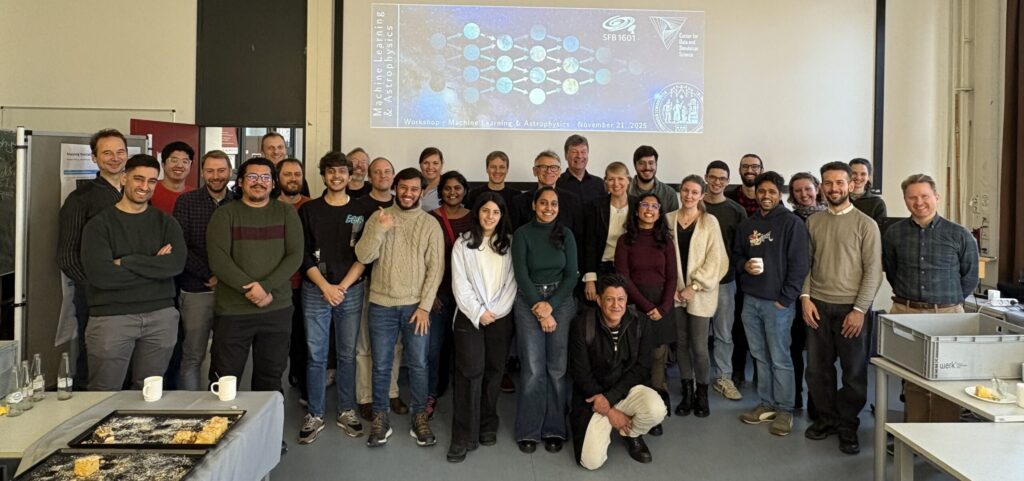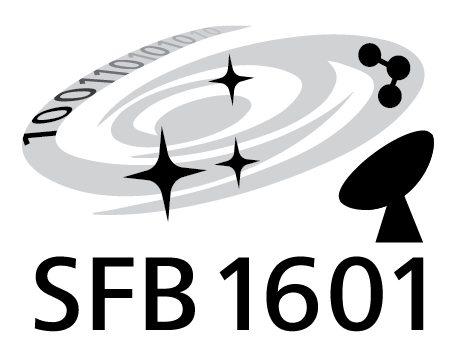Science Meeting: Bridging the environment gap and the spatial scale gap II
28.01.2026, 9am – 4pm
Old Workshop, I. Physics Institute, Cologne
| 9:00 – 9:10 | Welcome & Introduction | Stefanie Walch-Gassner |
| 9:15 – 9:30 | A cloud-scale and multi-phase and view of the star formation quenching process | Dario Colombo |
| 9:30 – 9:45 | Non-equilibrium-ionisation models for nebulae around massive stars, and predicted line emission | Jonathan Mackey |
| 9:45 – 10:00 | The lifetime of 100,000 molecular clouds in the nearby Universe. | Zein Bazzi |
| 10:00 – 10:15 | Spiral Arm-Driven Velocity Dispersion in the Warm Neutral Medium | Wajdee Chayeb |
| 10:15 – 10:30 | BREAK | |
| 10:30 – 10:45 | CO-HCN-SFR variations across spiral arms in NGC 4321 and M51 | Minou Greve |
| 10:45 – 11:00 | A second hot core in the outer Galaxy: impact of metallicity on the formation of complex organic molecules | Youxin Wang |
| 11:00 – 11:15 | The Extent of AGN Feedback on the ISM | Mallory Thorp |
| 11:00 – 12:00 | Discussion Round | |
| 12:00 – 13:00 | BREAK | |
| 13:00 – 14:30 | Postersession & Discussion | |
| 14:30 – 15:30 | SFB1601/II Proposal Discussion Round | Arshia Jacob |
| Posters | ||
| 1 | Teo Topkaras | |
| 2 | High-Resolution Molecular Line Mapping in M51 and Milky Way | Ina Galic, Mallory Thorp |
| 3 | Modeling OH masers in G034.256+0.145 | Ying-Chi Hu |
| 4 | WCCC vs. HC Chemistry: Spatial Distribution of Deuterated Species in Protostars | Morgan Owen |
Registration is mandatory!

Machine Learning & Astrophysics — 21 November 2025
This one-day workshop is part of the CDS workshop series Machine Learning + X. The workshop is jointly organized by the Center for Data and Simulation Science (CDS) and the SFB 1601.
https://cds.uni-koeln.de/en/workshops/mlaa-2025
Agenda
Date: 21 November 2025, 09:00 – 14:00 (tentative time window)
Location: Building 125, Seminar Room 1.01
Organization: Center for Data and Simulation Science (CDS) and SFB 1601
Contact: Lea Saßmannshausen (CDS)
Contributed Talks
| Speaker | Title |
|---|---|
| Andreas Lintermann | Integration of AI in Physics Simulations |
| Aleksander Bojchevsky | Trusting the Untrustworthy: Toward Reliable AI for Science |
| Stefan Kesselheim | Simulations, surrogates, statistics: Machine Learning in Astrophysics and beyond |
Poster Contributions
| Contributors (Pitch, Poster) | Collaborators | Pitch Title |
|---|---|---|
| Devika Bhatnagar | V. Balakrishnan, V. Venkatraman Krishnan, P. Freire, M. Kramer | The Pulsar Sorting Hat: AI to Accelerate Discoveries of Relativistic Binaries |
| André Bresges | Functional Magnetic Resonance Imaging of Human Brain Functions during simulated car driving: Possible applications for a Shared Universe Engine | |
| Tobias Solymosi | T. Danowski, B. Jones, S. Kesselheim, P. Schilke | Prostellar structure recovery using deep learning |
| Jakob Dietl | J. Dietl, F. Pacaud, T. H. Reiprich, A. Rüttgers, Z. Lähner, A. Veronica | Uncovering the Giants in the Sky – Semantic Segmentation of Galaxy Clusters in Astrophysical Surveys |
| Lucie Flek | C. D. Le, D. Kaczér, K. Schmieden, M. Schott | Analyzing Gravitational Waves with Transformers |
| Aleyna Nuray Ortakoese | M. Weis, S. Walch-Gassner | Following Tracer Particles to Identify Filaments in Star-Forming Cores with HDBSCAN |
| Daniel Seifried | R. Patel, S. Walch | The filamentary ISM: Structure Identification and characterization |

Science Meeting: Bridging the environment gap and the spatial scale gap I
09.10.2025, 9am – 5pm
seminar room 0.03, ETP, Physics Institutes, Cologne
Registration is closed (mandatory!)
| 9:00 – 9:10 | Welcome & Introduction | Stefanie Walch-Gassner |
| 9:10 – 9:35 | What We Talk About When We Talk About Environments | Dario Colombo |
| 9:35 – 9:50 | Mapping the cold ISM with JWST: Molecular clouds across galactic environments in 66 nearby galaxies. | Zein Bazzi |
| 9:50 – 10:05 | Scale and environment gaps in galaxy formation models | Cristiano Porciani |
| 10:05 – 10:20 | Clocking the feedback time: Cross-correlation between star cluster and molecular gas distribution | Hao He |
| 10:20 – 10:30 | BREAK | |
| 10:30 – 10:45 | High-Resolution Molecular Line Mapping in M51 Using NOEMA SWAN | Ina Galic |
| 10:45 – 11:00 | Probing Multiplicity in Young and Embedded Massive Galactic Star Clusters with NACO/VLT | Chinmaya Nagar |
| 11:00 – 11:15 | Signatures of a hub-filament system located in the Ara constellation – triggered star formation in RCW108 | Lucas Labadie / Florian Peißker |
| 11:15 – 11:30 | A galaxy protocluster* in our cosmic neighborhood | Nikolaus Sulzenauer |
| 11:30 – 11:45 | Tracing Turbulent Gas Excitation in Dust-obscured Galaxies Across Cosmic Time | Prachi Prajapati |
| 11:45 – 12:30 | Discussion Round | |
| 12:30 – 13:30 | BREAK | |
| 13:30 – 15:00 | Postersession & Discussion | old workshop |
| Daniel Seifried | TBD |
| Anaïs Pauchet | Incorporation of proto-stellar disk model in 3D MHD simulations of dense core collapse: emphasis on binary formation and its effects |
| Leonard Kaiser, Daniel Seifried, Tim-Eric Rathjen, Vittoria Brugaletta, Stefanie Walch | Faraday rotation and magnetic field coherence: The impact of ISM properties |
| Aaron Beyer, Nikolaus Sulzenauer | Star-formation at the Eddington limit in HerS-1 |
| Aditi Sinha | 3D modelling of Clumpy ensembles in Photon-dominated regions(PDRs) |
| Clarissa Immisch, Lennart Buhlmann, Stefanie Walch-Gassner, Nikolaus Sulzenauer | [CII] Subgrid Model for High-Redshift Galaxies Based on Local ISM Simulations |
| Jonathan Mackey | Radio observations of stellar bow-shocks with the VLA and Effelsberg Telescopes |
Science Meeting: comparison of observations and simulations
08.07.2025, 10am – 3.30pm
To get to the old workshop, enter the Physics Institutes of the UoC, then turn into the staircase in front of the PH1. Go one floor down and go through the glass door, the old workshop is straight ahead.
Preliminary Program
10:00 – 11-30
Postersession
Old Workshop, PH1
11:30 – 12:00
break and change of room
12:00 – 12:05
Introduction
Stefanie Walch-Gassner
Room 0.01, ETP
12:05 – 12:25
Synthetic observations from the SILCC-Zoom simulations
Daniel Seifried
Room 0.01, ETP
12:25 – 12:45
ELD: Emission Line Diagnostics of the simulated ISM
Tim-Eric Rathjen
Room 0.01, ETP
12:45 – 13:05
The carbon puzzle in observations
Volker Ossenlopf-Okada
Astrochemical models propose abundant atomic carbon in a transitional layer around molecular gas. Instead observations show bright [CI] in the clouds and weak emission outside. There seems to be significant variability but observational statistics is so far insufficient to address any causal relation. Cosmic rays may play a fundamental role.
Room 0.01, ETP
13:05 – 13:30
The ‘Diamond Ring’: Insights from comparing simulations with observations
Simon Dannhauer, Sebastian Vider
Room 0.01, ETP
13:30 – 13:35
break
Room 0.01, ETP
13:35 – 13:43
Comparing simulations and synthetic observations of high-mass star-forming regions
Birka Zimmermann
Room 0.01, ETP
13:43 – 13:51
Astrochemical coupling of MHD simulations of massive star-forming regions
Akash Gupta
Room 0.01, ETP
13:51 – 13:59
Simulating and observing the hot phase of the ISM with bow shocks and binaries
Jonathan Mackey
Room 0.01, ETP
13:59 – 14:07
Scientific group: Massive Star Formation and Cluster Evolution, discussion and perspectives
Anaïs Pauchet, Emma Bordier, Chinmaya Nagar, Furkan Dincer
Room 0.01, ETP
14:07 – 14:15
Atomic hydrogen here, there, everywhere and its role in star formation
Arshia Jacob
Room 0.01, ETP
14:15 – 14:23
Synthetic spectra, real insight: Mapping protostellar core structure from spectral cubes with Deep Learning
Beth Jones, Timon Danowski, Tobias Solymosi
Room 0.01, ETP
14:23 – 14:40
break
Room 0.01, ETP
14:40 – 15:20
discussion
Room 0.01, ETP
15:20 – 15:30
wrap-up
possibility to continue discussion afterwards (open end)
Room 0.01, ETP
